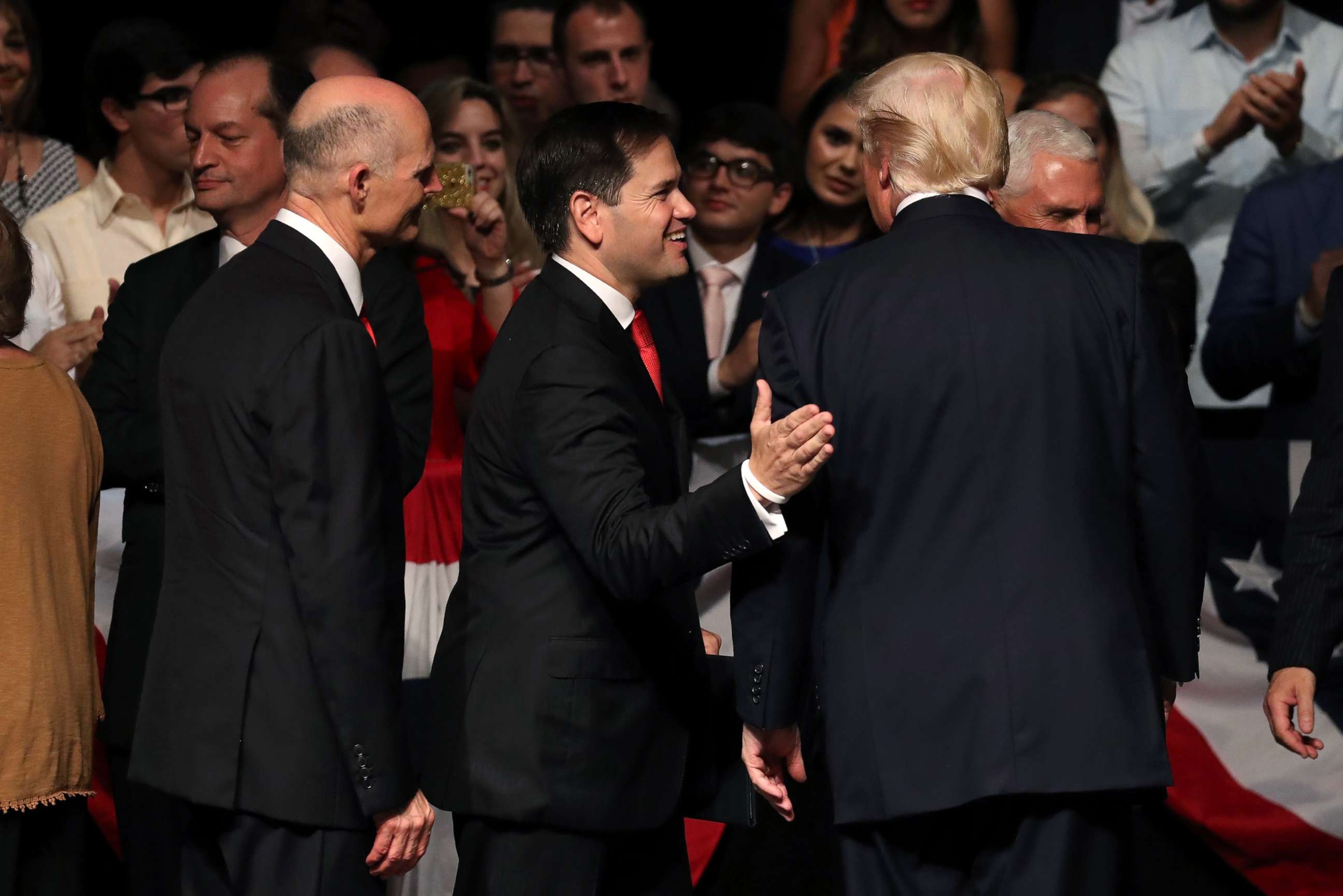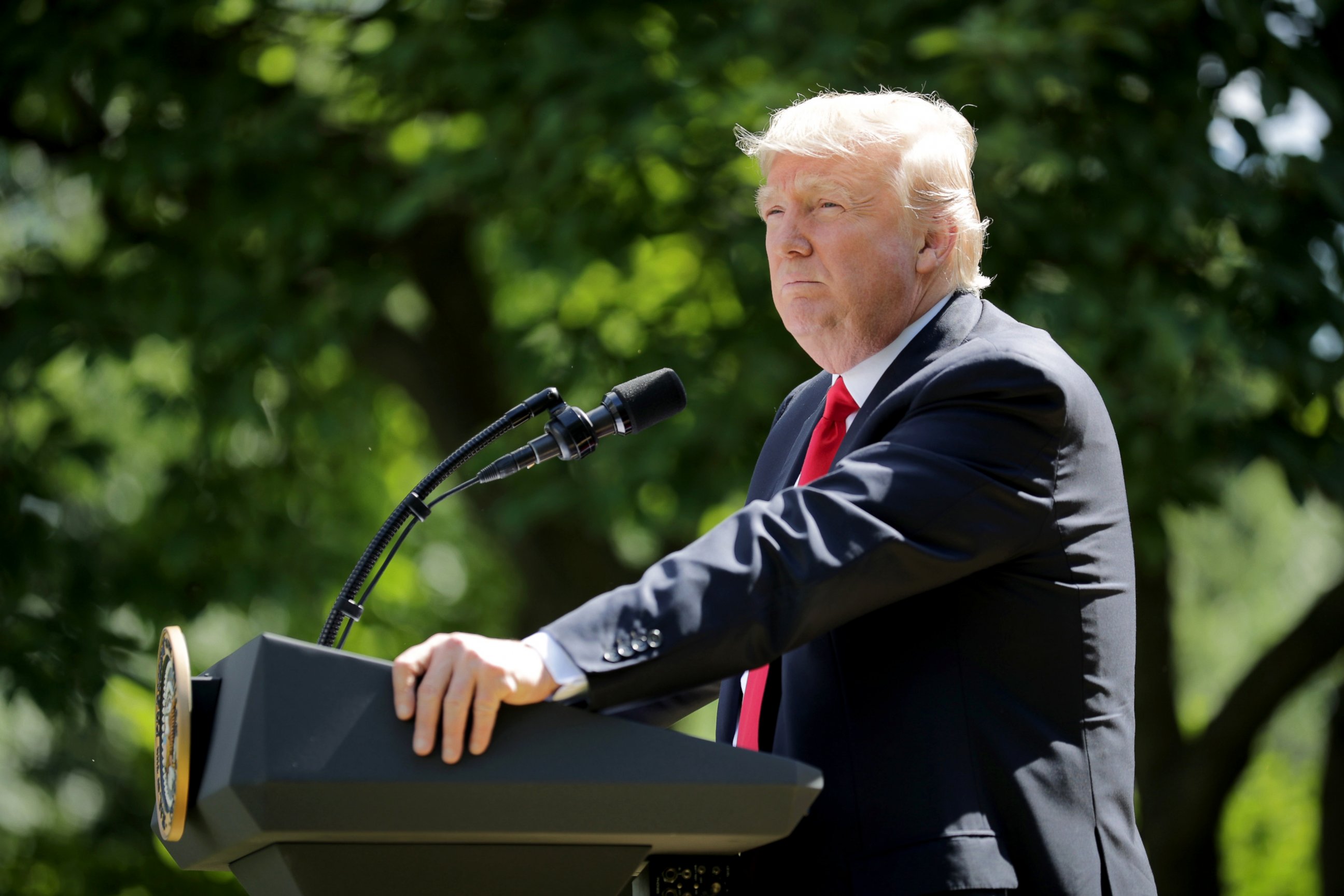Trump policy shifts contradict what most Americans want, polls reveal
Several of his biggest policy changes since taking office are not popular.
— -- A number of significant Trump administration policy changes fall out of line with views held by the majority of Americans, according to multiple recent polls.
Obamacare's popularity has been steadily climbing since Trump took office, and two of his reversals of major Obama-era policies — Trump's decision to withdraw the U.S. from the Paris Climate Accord and to restrict access to Cuba — go against the views of most Americans, according to polls cited below.
While Trump regularly touts his Electoral College victory, he lost the popular vote by a margin of nearly 3 million, which may be reflected in some of the post-election issue-based polling results.
Obamacare
Favorable views of Obamacare surpassed the 50 percent mark for the first time, according to a Kaiser Family Foundation poll released in late June, when the Republican-controlled Senate was debating and proposing its replacement health care plan.
In that poll — Kaiser conducts monthly health care tracking polls — 51 percent of respondents had a favorable view of the Affordable Care Act, 41 percent held an unfavorable view, and 8 percent didn't know.
By contrast, the Senate Republicans' plan was viewed favorably by 30 percent of respondents and unfavorably by 55 percent, with 16 percent not choosing either of those two options.
Trump bemoaned Obamacare throughout his presidential campaign and has continued to do so since his election. In the past week alone, he has described Obamacare as "expensive and dangerous," "melting down" and "a total disaster."
He has called for it to be repealed and replaced, but because of ongoing debate over the proposed Senate health care plan — a vote on which got postponed because of a lack of support — he has started to suggest that the ACA be repealed even if a replacement is not lined up.
Cuba

The latest large poll on Americans' views of the re-establishment of relations with Cuba and the loosening of travel restrictions to the island nation was a Pew poll released in December 2016, after Trump was elected but before his inauguration.
According to the poll, 75 percent of respondents approved of the re-establishment of diplomatic relations, including 62 percent of Republicans and GOP-leaning independents.
The same poll found that 73 percent of respondents favored ending the U.S. trade embargo on Cuba, including 62 percent of Republicans and GOP-leaning independents.
Those results were not dramatically different from the results of a similar ABC News/Washington Post poll released in December 2014, six months after then-President Obama loosened travel and trade restrictions on Cuba. According to that poll, 74 percent of respondents favored ending travel restrictions to and from Cuba.
Before the June 16 announcement of the rollback by Trump, sources told ABC News the decision to make the changes came at the request of two Cuban-American congressmen.
"Every single secretary, the overall recommendation consensus was that rolling back the Cuba policy — especially from a national security context — was detrimental to work being done in the region," one source with direct knowledge of the conversations told ABC News.
When he announced the policy change, which effectively reinstated pre-Obama restrictions, Trump suggested that the change would send a signal to Havana.
"We do not want U.S. dollars to prop up a military monopoly that exploits and abuses the citizens of Cuba," he said at an event in Miami. "Our new policy begins with strictly enforcing U.S. law. We will not lift sanctions on the Cuban regime until all political prisoners are free, freedoms of assembly and expression are respected, all political parties are legalized and free and internationally supervised elections are scheduled."
Paris Climate Accord

One of Trump's most controversial announcements was his decision to withdraw the U.S. from the Paris Climate Accord, making the U.S. one of three countries in the world to step back from the agreement. The other two are Syria, which is in the midst of a yearslong civil war, and Nicaragua, which has stated that it believes the agreement does not go far enough.
The decision reportedly caused friction within the White House, with the president's chief economic adviser Gary Cohn and daughter Ivanka Trump believed to have lobbied the president to stay in the accord.
Multiple polls suggest the majority of Americans are on the first daughter's side. Days after Donald Trump announced the decision to withdraw, for example, 59 percent of respondents to an ABC News/Washington Post poll opposed the withdrawal, and 28 percent supported it.
More than half of respondents — 55 percent — thought the decision to withdraw will hurt American leadership around the world, and 51 percent thought it would hurt international efforts to address climate change.
An April 20 Quinnipiac University poll reported that 66 percent of respondents believed Trump should not remove specific regulations intended to combat climate change, with 25 percent saying he should remove them.
Those results fell along party lines, with 91 percent of Democratic and 35 percent of Republican respondents saying that Trump should not remove regulations intended to combat climate change.
Before the inauguration, there was an ABC News/Washington Post poll that asked if people support or oppose U.S. withdrawal from "the main international treaty that tries to address climate change." The majority of respondents — 56 percent — opposed withdrawal, 31 percent supported withdrawing, and 13 percent had no opinion.
There is a disparity not only between what the people want and what Trump has done but also between what Trump and people believe on the subject.
A separate Quinnipiac poll from April 2017 showed that the majority — 76 percent — of voters polled do not believe that climate change is a "hoax," as Trump has said. Beyond that, 65 percent of respondents said that climate change is caused by human activity, while 28 percent disagreed with that statement.
Trump's stance on that issue remains unclear. At a White House press briefing on May 30, press secretary Sean Spicer was asked a fundamental question related to the Paris Climate Accord: Does the president believe human activity contributes to climate change?
"I can't say," Spicer said. "I haven't asked him. I can get back to you."
No such answer has ever been produced by Spicer.
And on June 27, Secretary of Energy Rick Perry was asked by ABC News' chief White House correspondent Jon Karl if he had talked to Trump about his earlier claim that climate change is a hoax.
Perry's response? "I have not had that conversation with him."




